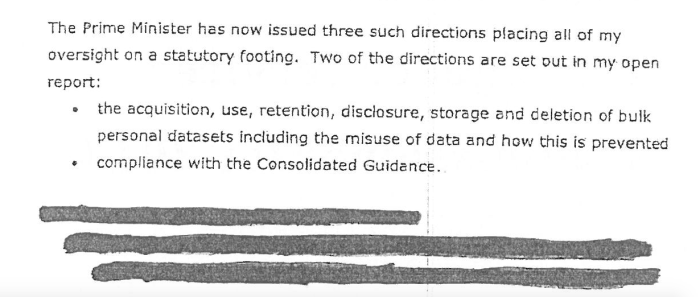Third Direction challenge
Exposing and challenging a secret MI5 policy authorising informants to commit crimes in the UK
Privacy International, Reprieve, Committee on the Administration of Justice & Pat Finucane v Secretary of State for Foreign and Commonwealth Affairs, Secretary of State for the Home Department, and others
Court: Investigatory Powers Tribunal
Case No IPT/17/86/CH, IPT 17/87/CH
Status: Closed
In June 2017, Privacy International and Reprieve began a legal challenge on the basis that the conduct overseen under the third direction was unlawful, not least because it was entirely secret. Faced with the prospect of defending these proceedings, the Government published the third direction on 1 March 2018. It was then revealed that the third direction instructed the Commissioner to keep under review the application of the Security Service guidelines on the use of agents who participate in criminality and the authorisations issued in accordance with them. This is the first time that the UK Government has acknowledged that guidance exists to regulate criminal activity within the United Kingdom by 'agents' recruited by MI5.
In April 2018, the Committee on the Administration of Justice and the Pat Finucane Centre joined the case.
In Privacy International’s Bulk Personal Datasets/Bulk Communications Data (BPD/BCD) claim, the Security and Intelligence Services disclosed that the Prime Minister had issued three directions to the Intelligence Services Commissioner. The first direction was public. The second direction was made public in the course of the BPD/BCD claim. But the subject matter and date of the third direction remained secret. This is the reason why this challenge was introduced.
Through this case it was revealed that the Security Service “authorises” its so called agents (not MI5 officials) to carry out crimes in the UK. No meaningful limits to it have been disclosed. It appears that the Security Service thinks it could, if it believes it would be in the public interest, authorise participation in murder, torture, sexual assault or other grave criminality in the UK. Neither the victim of the crime, nor the police or the Crown Prosecution Service are notified of authorisations. In practice, this means that criminal conduct will never be investigated or prosecuted. Oversight to date has been extremely limited and so narrow as to be ineffective. Together with the other claimants, we are concerned that the activities overseen under the secret policy may breach the UK’s domestic and international human rights obligations.
On 27 July 2020, the Investigatory Powers Tribunal rejected our application. On 9 March 2021, the Court of Appeal also refused to proceed. In the meantime, the UK government introduced Covert Human Intelligence Sources (Criminal Conduct) Act 2021 to regulate the matter.
